If you have gutters, chances are you’ve also had the annoying dripping noise that comes along with them. This can be especially bothersome at night when you’re trying to sleep. There are a few different ways that you can stop the dripping noise from gutters.
Why Do My Gutters Drip?
There are a few things that you can do to stop the dripping noise from gutters. If you have gutters that drip, you know how annoying it can be. Not only is the dripping noise annoying, but it can also damage your gutters and cause them to rust.
Clogged Gutters or Downspout
When gutters or downspouts are clogged, the water has nowhere to go but back up into the gutter, causing it to overflow and drip. One of the most common causes of gutters dripping is a clogged gutter or downspout. Clogged gutters can also cause the gutters to sag, which can lead to even more dripping.
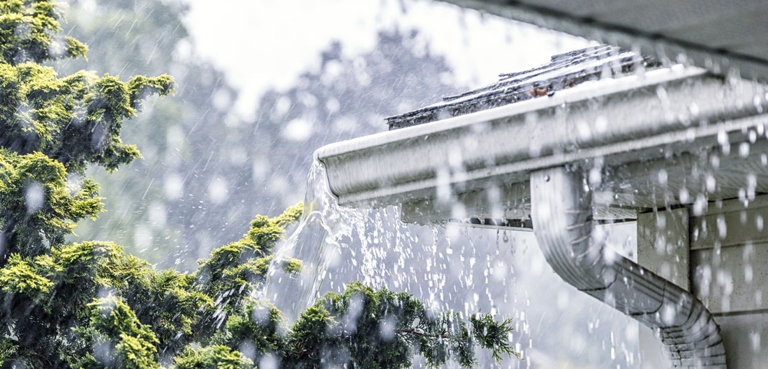
To prevent gutters from dripping, it’s important to keep them clean and clear of debris. This means regularly cleaning out the gutters and downspouts, and making sure that there are no leaves, twigs, or other debris blocking the flow of water. If you live in an area with a lot of trees, you may need to clean your gutters more often.
If there is any damage to the gutters or downspouts, you’ll need to repair or replace them as well. If the gutters are sagging, you may need to replace them. If your gutters are already dripping, you’ll need to clear the blockage and then check for any damage.
Wrong Slope Angle
If the slope angle is too steep, then water will run off of your roof too quickly and will not have time to be absorbed into the gutters. This will cause the gutters to overflow and drip. There are a few reasons why your gutters may drip, but the most common reason is that the slope angle of your gutters is wrong. The slope angle is the angle that your gutters are installed at in relation to your roof.
Minor Cracks or Holes
Over time, these cracks and holes can become bigger and allow more water to seep through. If you have minor cracks or holes in your gutters, there are a few things you can do to try to fix them. In some cases, the gutters may even need to be replaced. One of the main reasons that gutters drip is because of minor cracks or holes.
Another option is to replace the gutters. One option is to use a sealant to fill in the cracks and holes. This can be done yourself with a sealant kit, or you can hire a professional to do it for you. This is usually only necessary if the gutters are severely damaged or if you live in an area with a lot of rainfall.
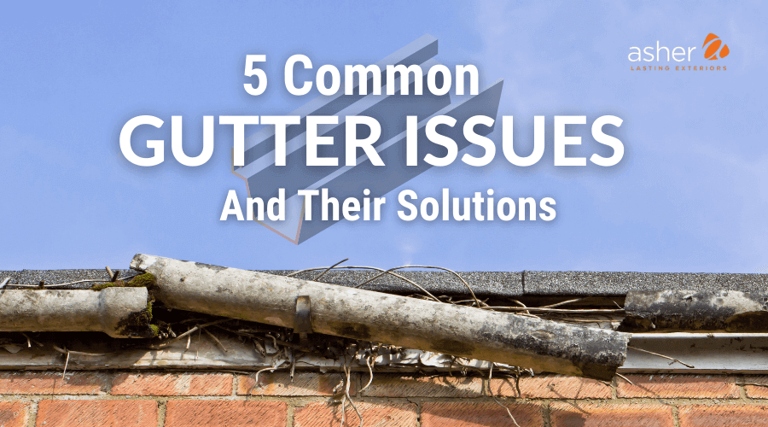
Another option is to replace the gutters. This can be done yourself with a sealant kit, or you can hire a professional to do it for you. If you have minor cracks or holes in your gutters, there are a few things you can do to try to fix them. This is usually only necessary if the gutters are severely damaged or if you live in an area with a lot of rainfall. One option is to use a sealant to fill in the cracks and holes.
Loose Screws
Loose screws are one of the most common causes of gutter drip. In some cases, the screws may even fall out completely, leaving your gutters unsupported. Over time, the screws that hold your gutters in place can become loose, causing the gutters to sag and drip.
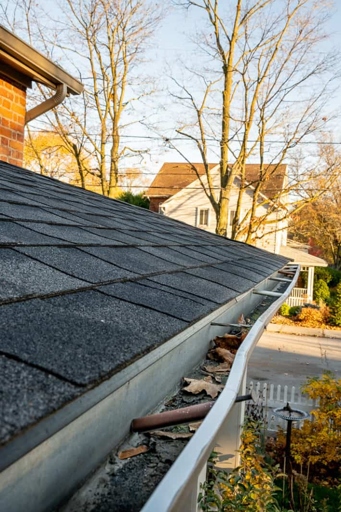
If you notice that your gutters are dripping, it’s important to check the screws to see if they are loose. If the screws are completely missing, you’ll need to replace them with new ones. If they are, simply tighten them with a screwdriver.
When leaves, twigs, and other debris accumulate in your gutters, it can cause them to clog and drip. To prevent this, be sure to regularly clean your gutters and remove any debris that has collected. In addition to loose screws, another common cause of gutter drip is debris build-up.
How to Stop Dripping Noise From Gutters
In this section, we’ll share 7 effective ways to stop the dripping noise from gutters. If you’re looking for ways to stop the dripping noise from gutters, you’ve come to the right place. The dripping noise from gutters can be extremely annoying, especially if it’s happening right outside your bedroom window.
Method 1: Insert a Sponge Inside the Downspout
This will help to absorb the water and reduce the dripping noise. One way to stop the dripping noise from gutters is to insert a sponge inside the downspout.
Method 2: Use PVC Elbow
Once the elbow is in place, you will need to seal it with silicone caulk. You will need to measure the length of the gutter run and cut the PVC elbow to fit. If your gutters are dripping and making noise, there are a few things you can do to stop the noise. Then, you will need to attach the elbow to the gutter with screws. One method is to use a PVC elbow.
Method 3: Check Loose Screws
To fix this, simply check all of the screws on your gutters and tighten them if necessary. This should stop the dripping noise. If your gutters are making a dripping noise, it’s likely because there are loose screws.
Method 4: Readjust the Downspout Angle
Then, you can adjust the angle of the downspout until the water is directed away from your home. This will help direct the water away from your home and reduce the dripping noise. To do this, you will need to loosen the screws that hold the downspout in place. If your gutters are dripping water onto your roof or windows, you can try readjusting the downspout angle.
Method 5: Swap to a Rain Chain
Method 5: Swap to a Rain Chain
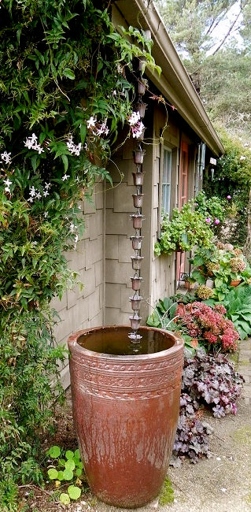
Rain chains are a decorative way to channel water away from your home, and they can be much quieter than traditional gutters. If you have a gutter that is constantly dripping water, you may want to consider swapping it out for a rain chain. Plus, they’re easy to install – you can even do it yourself!
Method 6: Guide the Water With a Nylon Rope
Then, you can place the rope in the ground so that it is level with the gutter. You may need to adjust the rope as the water level changes. If you have a gutter that is dripping water, you can try to guide the water with a nylon rope. This will help to direct the water away from the house and into the ground. You will need to tie the rope around the gutter so that it is tight.
Method 7: Insulate the Downspout
Method 7: Insulate the Downspout
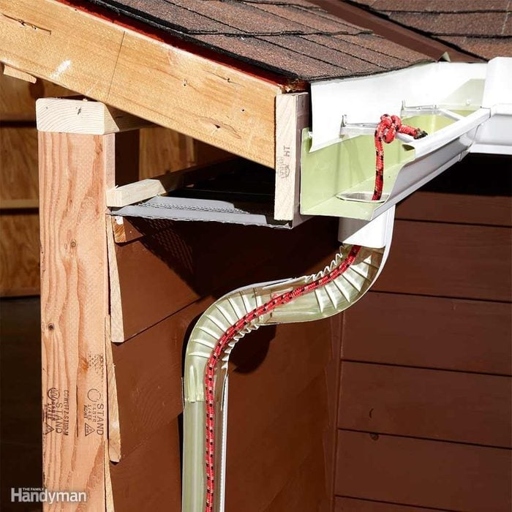
If your downspout is making a dripping noise, you can try insulating it with foam insulation. This will help to reduce the noise. Cut a piece of foam insulation to fit around the downspout, and then tape it in place with duct tape.
Method 8: Call an Expert
They might also be able to clean your gutters and check for any damage that could be causing the dripping noise. A professional can help you figure out what’s causing the dripping and how to fix it. If your gutters are still dripping after you’ve tried all of the other methods, it might be time to call an expert.
Frequently Asked Questions
1. What is the dripping noise from gutters?
The dripping noise from gutters is caused by water dripping down the sides of the gutters and onto the ground below. This can be caused by a variety of things, including leaves and other debris clogging the gutters, holes in the gutters, or simply from the gutters being old and in need of repair.
2. How can I stop the dripping noise from gutters?
There are a few different ways that you can stop the dripping noise from gutters. One way is to clean the gutters out on a regular basis. This will help to remove any leaves or other debris that may be causing the noise. Another way is to repair any holes or other damage to the gutters. Finally, you may need to replace the gutters altogether if they are old and in need of repair.
3. Why is it important to stop the dripping noise from gutters?
The dripping noise from gutters can be annoying, but it can also be a sign of a more serious problem. If the gutters are not cleaned out regularly, they can become clogged and cause water to back up and overflow. This can lead to damage to your home’s foundation or even flooding.
4. How often should I clean my gutters?
It is generally recommended that you clean your gutters at least once a year. However, if you live in an area with a lot of trees, you may need to clean them more often.
5. What are some signs that my gutters need to be replaced?
There are a few signs that you may need to replace your gutters. If they are more than 20 years old, they may be in need of replacement. Additionally, if you see any cracks or holes in the gutters, or if they are sagging or pulling away from the house, they should be replaced.
Final thoughts
If you have a dripping noise coming from your gutters, there are a few effective ways to stop it. You can seal the gutters with silicone caulk, use gutter guards or covers, or clean the gutters and downspouts regularly. You may also need to replace the gutters if they are old or damaged.
